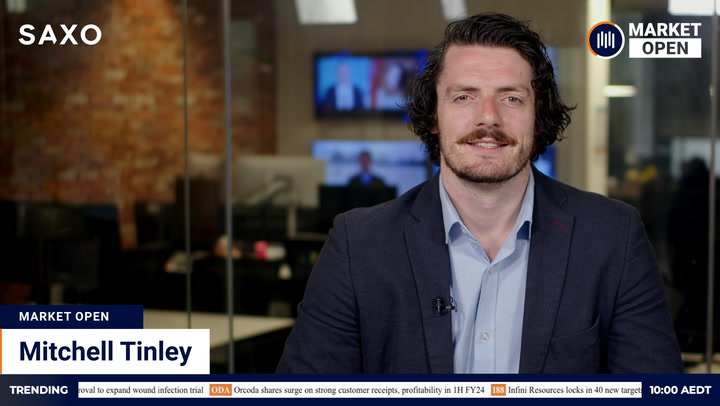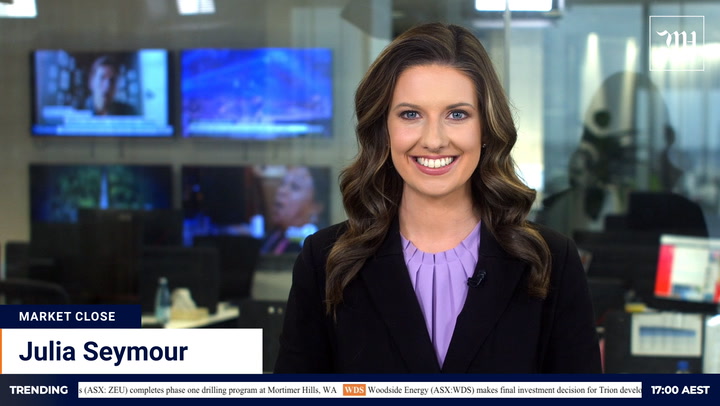Sharp declines in key commodities pointed to early pressure on Australian shares following a mixed close on Wall Street.
US stocks stemmed a week of bloodletting ahead of a public holiday tonight. However, falls in iron ore, copper, crude and gold appeared likely to weigh when the ASX opens this morning.
ASX futures slipped 19 points or 0.3 per cent. The S&P/ASX 200 has fallen for six sessions, closing on Friday at its weakest since November 2020.
Wall Street
US stocks steadied at the end of a week dominated by a jumbo rate rise, weakening economic signals and heavy selling on equity markets. The main indices ended mixed in choppy trade during a “quadruple witching” session as four types of futures and options contracts expired.
The S&P 500 eked out a rise of eight points or 0.22 per cent. The Dow Jones Industrial Average slipped 38 points or 0.13 per cent. The Nasdaq Composite led with a rise of 152 points or 1.43 per cent.
“After the extreme moves that we’ve seen over the past week, it’s sort of an exhausted market looking to a three-day weekend and just trying to find a place to settle in,” John Canavan, lead analyst at Oxford Economics, told CNBC.
A bruising week saw the S&P 500 plunge 5.8 per cent, its worst weekly loss since March 2020. The Dow and Nasdaq Composite both shed 4.8 per cent.
“It was a bad week, it was a really bad week,” Joe Saluzzi, co-head of equity trading at Themis Trading, told MarketWatch.
Stocks tanked on Thursday after the Federal Reserve raised the federal funds rate by 75 basis points and signalled more bumper increases to come. Disappointing retail sales, industrial production and housing data pointed to growing pressure on the US economy.
“Near-term recession has become a foregone conclusion for many investors,” Chris Harvey, head of equity strategy at Wells Fargo Securities, said. “The only questions now are its duration and the severity of its impact on earnings.”
The Dow closed under the psychologically-significant 30,000 level for a second day. The blue-chip average has fallen for 11 of the last 12 weeks. Walmart, Goldman Sachs and Chevron were the biggest weights on Friday, offsetting gains in Boeing and AmEx.
Tech and travel stocks pared heavy weekly losses. Amazon, Meta Platforms, Apple and Tesla all rose. Cruise lines Carnival and Norwegian reversed much of Thursday’s double-digit declines.
The energy sector was notably weak, slumping more than 5 per cent as crude dived by a similar percentage.
Australian outlook
A US market holiday may provide a welcome circuit-breaker from two weeks of torrid selling on the ASX. However, futures action suggests limited enthusiasm among punch-drunk investors.
The ASX 200 has given up more than 10 per cent of its value in a fortnight, entering a technical correction. With Wall Street in a bear market, investors fear worse may be to come.
A two-speed market seems likely today in the light of US leads. Three sectors associated with Big Tech led on Wall Street, rising 1-1.3 per cent. Financials, property and healthcare advanced by smaller amounts.
A problem for the S&P/ASX 200 is heavily-weighted BHP and Rio Tinto logged sharp declines in overseas trade after iron ore – Australia’s most valuable export – sank to a six-month low (more below). In addition, the energy sector plunged 5.57 per cent. Utilities and consumer staples also fell.
Volatility in cryptocurrencies over the weekend may affect market sentiment. Bitcoin dived under US$20,000 on Saturday before rebounding overnight.
Trading volumes over the next two sessions will likely weaken as some US traders take advantage of tonight’s Juneteenth national holiday. The New York Stock Exchange, Nasdaq and other exchanges are closed tonight.
The looming end of the financial year means another week of tax-loss selling. There is no shortage of candidates this year with speculative interest in the dumps and two-fifths of the ASX 200 trading at 52-week lows on Friday.
Of course, tax-loss selling also opens opportunities to pick up stock at depressed prices. One investor’s loss is another’s bargain entry point.
Central banks dominate the economic calendar this week. Reserve Bank Governor Philip Lowe addresses a Sydney event tomorrow on monetary policy and the economic outlook. The minutes from this month’s rates meeting, released the same day, should provide greater insight into the likely rates trajectory this year.
Lowe is also due to participate in a panel discussion on monetary policy in Zurich on Friday night. In the US, Fed Chair Jerome Powell testifies before the Senate Banking Committee on Wednesday and Thursday.
IPOs: unsurprisingly, there is not a lot of interest in plunging into these stormy seas. The ASX has just three companies pencilled in to list this week: Coolabah Metals and Odette Six Metals on Wednesday, and Leo Lithium on Thursday. As always, listings could be subject to last-minute changes or cancellations.
The dollar bounced 0.7 per cent this morning to 69.2 US cents.
Commodities
Iron ore crumpled to a sixth straight loss and a six-month low on Friday as weak margins and demand prompted steel mills to reduce production. Benchmark ores imported into northern China fell US$5.76 to US$121.64 a tonne, a level last seen in mid-December.
Seasonal rains have disrupted Chinese construction activity, undermining demand for steel, according to Reuters. The most-traded ore contract on the Dalian Commodity Exchange slumped 5.9 per cent to US$122.64.
“In recent weeks an increasing number of mills in the steel-making hub of Tangshan are opting to undertake maintenance and cut output amid weak margins. The lack of rebound in industrial activity was confirmed by a contraction in electricity demand last month,” ANZ senior commodity strategist Daniel Hynes said.
BHP‘s US-traded depositary receipts sank 4.07 per cent. The miner’s UK stock shed 3.3 per cent. Rio Tinto gave up 5.14 per cent in the US and 4.9 per cent in the UK.
Oil succumbed to fears of a global recession after resisting “risk-off” pressures for most of last week. Brent crude settled US$6.69 or 5.6 per cent lower at US$113.12 a barrel.
For the week, the international benchmark lost 7.3 per cent. Last week’s fall was Brent’s first in five weeks.
“Demand concerns are on the rise because of growing expectations that the global economy is heading for a slowdown in the coming months,” Fawad Razaqzada, market analyst at City Index, said. It’s “possible that the slowdown will be more severe than expected and that’s what investors are worried about the most.”
Copper shed initial gains as the US dollar strengthened. Benchmark copper on the London Metal Exchange dropped 1.2 per cent to US$8,967 a tonne. Aluminium lost 0.2 per cent, lead 1.9 per cent, zinc 1.5 per cent and tin 2.6 per cent. Nickel lifted 1.6 per cent.
Gold gave up some of its post-US rate rise advance. Gold for August delivery settled US$9.30 or 0.5 per cent lower at US$1,840.60 an ounce. The NYSE Arca Gold Bugs Index dropped 1.33 per cent.





